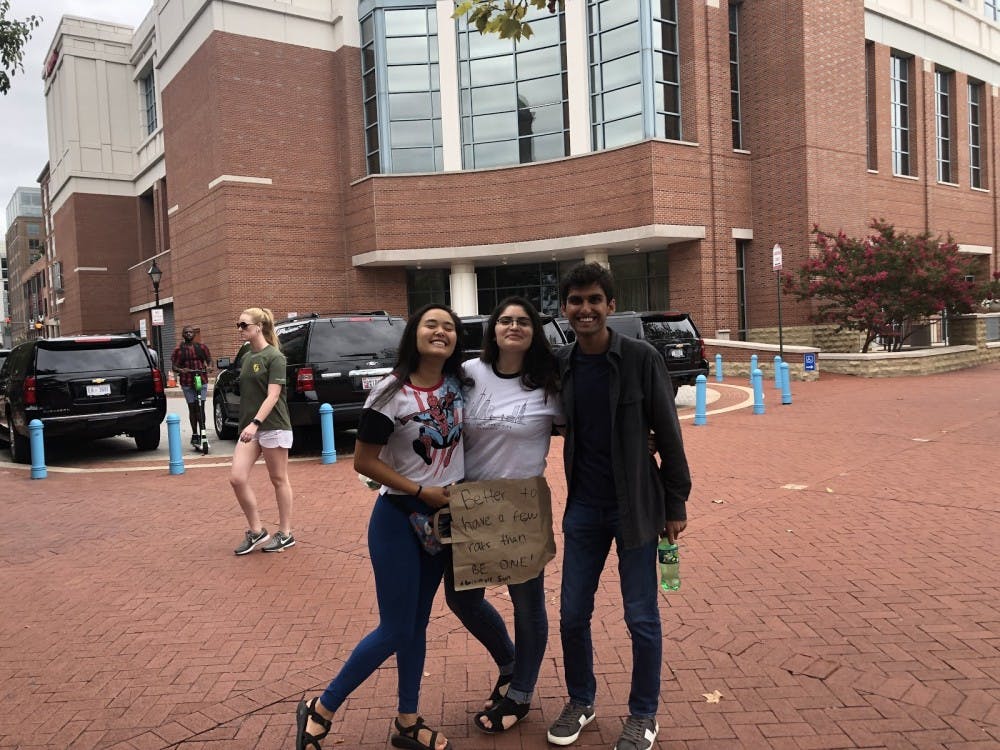Activist group Baltimore Welcoming Committee held a labor protest featuring singing and chanting in Harbor East on Friday afternoon. The musical demonstration was part of a series of events organized in light of U.S. President Donald Trump’s attendance at a retreat for Republican lawmakers this weekend. Trump’s Baltimore appearance marks his first visit to the city since calling it a “rat and rodent infested mess” on Twitter in July.
About 30 protesters holding keyboards, guitars and clarinets gathered in front of the Baltimore Marriott Waterfront hotel, where Trump was scheduled to speak.
In an interview with The News-Letter, junior Nihaal Rahman reflected on how the musical element of the demonstration united attendees from various backgrounds.
“I didn’t know what to expect from a ‘musical protest,’ but it was honestly a very empowering experience,” he said. “Since the entire protest was centered around union rights, I didn’t know how we’d be received as four students walking in with seemingly no connection to the cause. However, they brought us in with open arms, and the sense of camaraderie was really inspiring.”
Attendees were given the opportunity to explain on a microphone why they’d come to the protest.
Baltimore resident Rebecca Wearing expressed her sentiments toward Republicans by reading off her sign to the crowd.
“They would like to take our healthcare, they want to take our Medicare, they want to take our Social Security, they want to take our women’s rights, they want to take human rights, they want to take our public schools, our national parks, our country and our planet,” she said. “Every policy that they support is destructive to the common man — and women, especially women.”
Other protesters conveyed their motives for participating through song. Organizers asked attendees why they were there, to which the crowd sang revised lyrics to a tune called “Somebody’s Hurting My Brother.”
“Somebody’s hurting my sister, somebody wants to build that wall, somebody’s hurting our children and it’s gone on far too long,” they sang. “We won’t be silent anymore.”
While many of the songs were written for older generations, there were also other songs geared towards younger protesters. At one point, an organizer played “Uprising” by Muse in order to underscore the importance of rebellion.
In addition, protesters sang edited versions of labor songs to address issues that Baltimore currently faces, including corruption in the Baltimore Police Department.
“What did you learn in school today, dear little boy of mine?” they sang. “I learned how tough it is for the Baltimore Police to live up to a consent decree.”
Many songs were sung with anger directed toward Trump and House Republicans. However, organizers also encouraged the idea that disagreement and hate should not last forever.
Protesters chanted the song “We Shall Overcome.”
“We shall overcome someday,” they sang. “Oh, deep in my heart I do believe we’ll walk hand in hand someday.”
Many Baltimore residents were angered when Trump described Rep. Elijah Cummings’ district, which includes over half of Baltimore City and most of Baltimore County’s majority-black precincts, as a “very dangerous & filthy place” via Twitter.
Junior Maddie Nasaid that she attended the protest in order to get a first-hand look at Baltimoreans’ reactions to Trump’s visit.
“I wanted to understand how Baltimore residents felt about the president spending time here despite his malicious comments,” she said. “I think a musical protest is a wonderful and engaging way to make our voices heard.”
Rahman believes that, even in the face of Trump’s controversial tweets, demonstrators portrayed the strength of Baltimore community members.
“We were all able to partake in some way, whether it was singing along or banging on buckets to keep the beat going,” he said. “Even though the group was small, the energy and passion they displayed was immense and made me proud to call this ‘rat-infested’ city home.”





